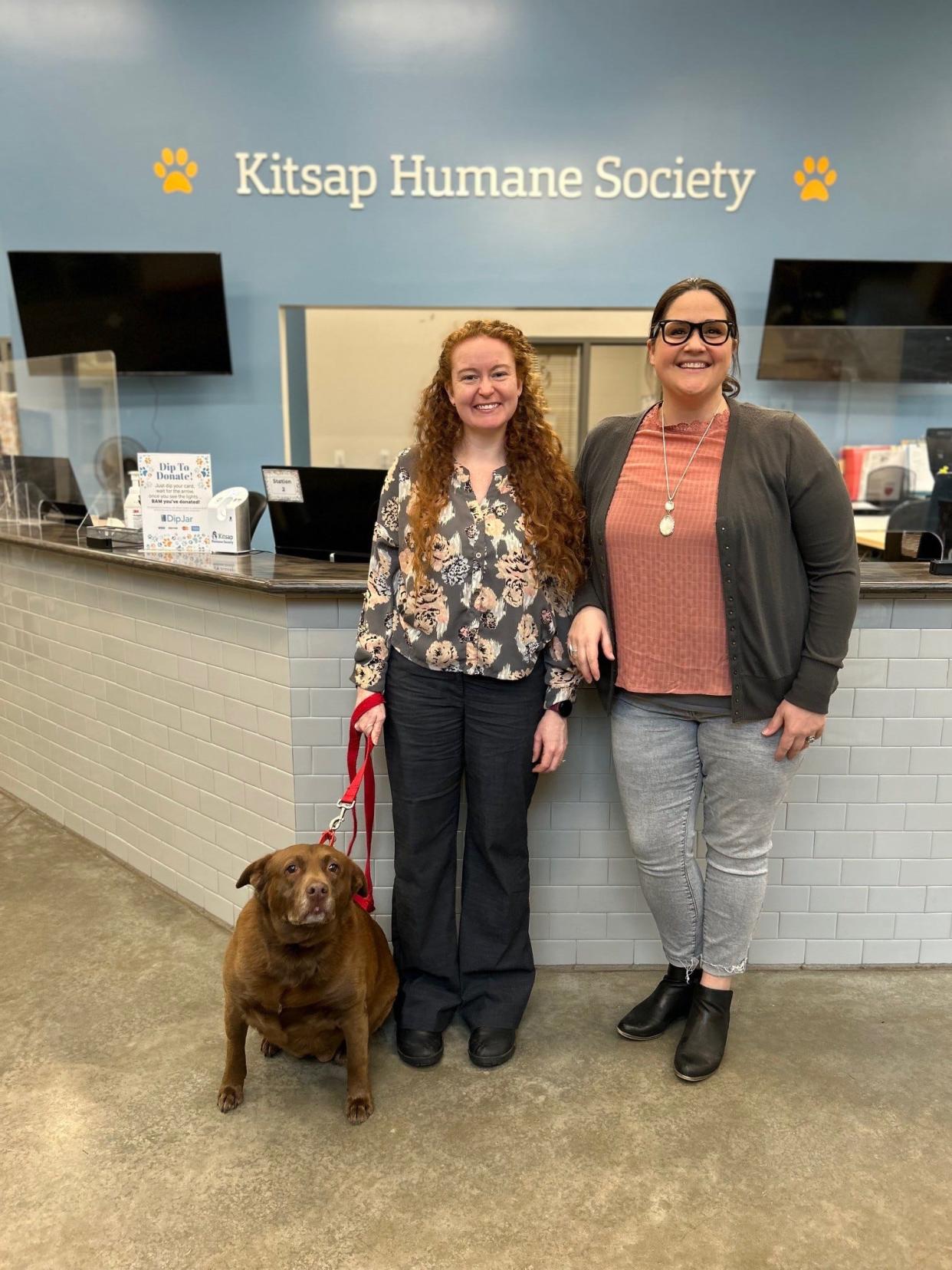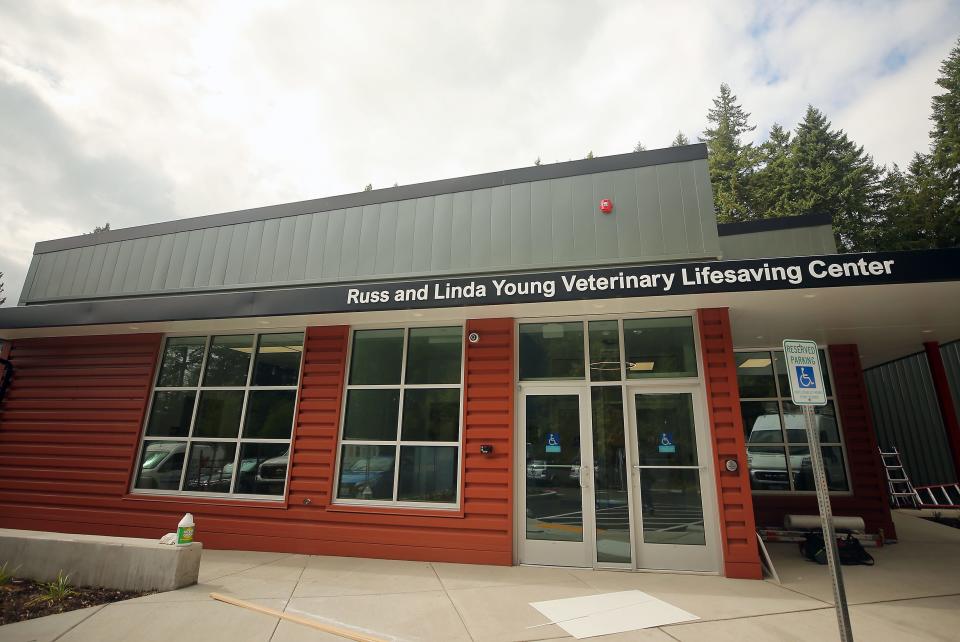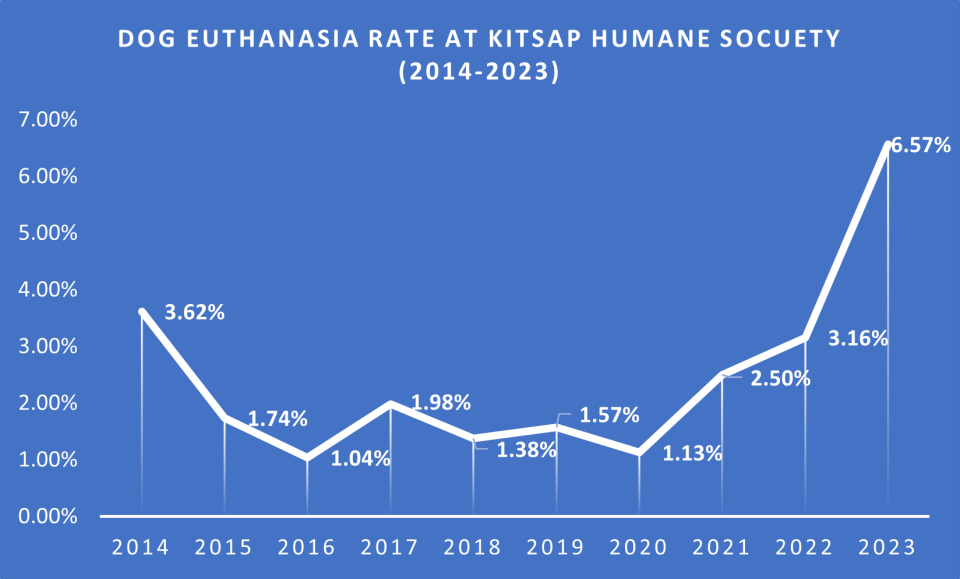Kitsap Humane Society appoints co-directors after year of interim leadership

SILVERDALE — A year after Kitsap Humane Society's executive director departed, the Silverdale-based nonprofit named two interim directors to co-lead the organization on a permanent basis.
Jamie Nocula and Jen Stonequist had served as interim co-executive directors since Lee Harper left the organization in March 2023. They will continue in the shared role leading KHS as of April 23.
“It’s an unusual arrangement to have dual Executive Directors,” KHS Board President Scott Menard said in a statement. “But Jamie and Dr. Jen each bring such outstanding talents to the job and complement each other so well, it was the obvious and perfect decision for the good of the shelter.”
Nocula becomes KHS's executive director of operations and philanthropy, focused on the day-to-day operations and fundraising for the organization. Stonequist is now executive director of programs and services and concentrates on the animal welfare and medical side of KHS, according to a statement announcing KHS's leadership change.
Nocula joined KHS in January 2021 as the director of philanthropy. Before coming to the organization, Nocula served as the associate executive director of Haselwood Family YMCA in Silverdale and the Curves International Operations Director for Oregon, Utah, Wyoming and Idaho, according to KHS.
Stonequist has served at KHS since 2011. She received her doctorate in veterinary medicine from Western University Health Sciences in Pomona, California and started her animal welfare career over two decades ago at a shelter in Florida, according to KHS.
Kitsap Humane Society, a private, nonprofit, charitable organization, has served the community since 1908.

Accomplishments as interim directors
Over the past year when Nocula and Stonequist served as co-interim executive directors, the organization raised $10 million to complete the construction of KHS's Russ and Linda Veterinary Lifesaving Center, which provides reduced-fee veterinary services for low-income families. In September, the vet clinic opened for emergency referrals from KHS's community veterinary partners, and in March opened to the general public who qualify. The two also oversaw the remodeling of KHS's existing admissions building and the construction of a big animal barn on the south end of campus, Nocula said.
"So we've worked together to fundraise, hit our goals, and remain debt-free as an organization and provide enhanced and increased programming spaces to serve as a safety net for our community," Nocula said.
"One of the largest factors that the board considered in allowing Dr. Jen and I to stay on as permanent EDs is our amazing ability to stand shoulder to shoulder and lead the charge together around the things that we feel are very important in our organization," Nocula told Kitsap Sun.
"As we stepped in in an interim fashion, we really found a groove together and we really aligned on a lot of the priorities that we have, so not only were we able to step in and really help the staff and the volunteers and the team move forward, but we really enjoy working together, too, which is a huge plus," Stonequist told Kitsap Sun.
More: New veterinary clinic, barn and other renovations are underway at Kitsap Humane Society
Selection criticized by some former volunteers, staff
The board's appointment was criticized by some former KHS volunteers who left the nonprofit in the past few months, claiming they no longer could bear to volunteer due to leadership and the work environment.
Pat and his wife, Ann Garrett, who had volunteered at KHS for 9 years and 3 years respectively, said they resigned from the volunteer role in January due to a series of actions from the leadership. They said staff members and volunteer dog walkers quit in the past year and that resulted in the lack of enough volunteers taking care of the dogs at KHS. They resigned after Pat opened a door that was supposed to stay closed when he was looking for a dog, and was warned not to do so, they said.
According to the Garretts, several volunteers with years of experience — they calculated more than 37 years of service combined — were disappointed with management and also resigned. They cited micromanagement regarding shelter operations and volunteer frustration at not being listed to by an organization they loved and served for a long time.
Former staff member Katie Kenison, who was hired as an admissions coordinator assistant in June 2022 and was fired from the organization in June 2023, following Harper's departure, described to Kitsap Sun an understaffed working condition she had experienced before leaving KHS. Kenison said she regularly was asked to work more than her original 25-hours-per-week schedule. Kenison mentioned that new rules and standards, some not related to her job duties, she said, were created and assigned without instructions on how to implement them. After a disagreement with a director, she was fired from the position that she said was once her dream job. Kenison had volunteered for KHS on and off since she was 13 years old, she said.
Tina Chenevert, a KHS volunteer for about 9 years and also a former KHS board member for about 5 years, said she was fired by KHS after she had a meeting with leadership where she raised concerns of volunteers, including mentioning a dog that had been euthanized.
Chenevert and her husband, Doug Blangsted, have both been KHS donors, including the organization in their will at one point. Blangsted said they have since removed KHS from their planned bequests.
Chenevert also questioned a euthanasia rate for dogs sent to KHS that doubled from 2022 to 2023.
According to KHS statistics, the euthanasia rate for dogs taken to KHS jumped from 3.16% in 2022 to 6.57% in 2023. In 2022, 1,362 dogs were taken to KHS and 43 dogs were euthanized. In 2023, 1,416 dogs came to KHS and 93 were euthanized. In 2021, 31 dogs were euthanized out of 1,238 dogs taken to KHS.
The euthanasia rates for dogs in the past two years are also higher than those between 2015 and 2021, which range from 1.04% to 2.5%, according to KHS statistics.

Directors say staffing levels are adequate, poised for growth
Nocula and Stonequist pushed back against the narrative that dogs were not taken care of due to a loss of volunteers and staff members. They said KHS now has 74 staff members, including full-time and part-time, which is the largest number of staff KHS has ever had.
Nocula and Stonequist confirmed that during their time as co-executive directors, the organization fired one staff member for cause, one volunteer was asked to leave, and six volunteers chose to leave the organization.
Nocula did mention issues raised by other volunteers about behavior by the dismissed employee that was "disruptive to the direction that we were moving the organization."
She added that several volunteers were offered one-on-one conversations about improving performance. Nocula said some took the feedback positively while others took offense to what was perceived as criticism and chose to quit.
In November 2023, before KHS lost the seven volunteers, there were 256 volunteers in the organization, KHS Director of Communications Michael Bush provided the data. As of May 9, KHS has 375 volunteers and additional 55 pending volunteers who are waiting to be trained, Bush said.
As for staff members, in April 2023, shortly after the interim co-executive directors were onboard, KHS had 65 staff members. In total, 11 staff members resigned in the past year due to various personal reasons, Bush said. And now the organization has 74 staff members.
Nocula said they've heard from people who care about the organization reaching out to them daily regarding the negative and false narrative shared on social media. She said dogs are being taken care of at KHS and she encourages everyone to visit KHS to check.
"Our dogs are being, you know, they're going on outings, and they're getting more in kennel enrichment and engagement, and adoptions are up," Nocula said. "There's so many positive things, And the best thing that we do when we're met with that is we invite people to come here. Come take a tour of the campus."
"I give tours, dozens of them, and show them everything that's happening in the front and behind the scenes because we have nothing to be ashamed of. We have nothing to hide," Nocula said. "To the contrary, we are very proud of the work that we're doing here," Nocula said.
"This is a great place to be and I'm sad that there's a few people that don't see it that way," Nocula said.
Nocula also said that last spring, KHS hired a second full-time staff member in its volunteer team besides an existing full-time employee to manage the volunteers.
"When we took the helm last year, there was only one full-time person in volunteer role and we recognized immediately that the volunteer program that we have needed more support. And so we made the investment in another full-time person to support the needs of our volunteers," Nocula said.
In terms of the rising euthanasia rate, Stonequist said after COVID-19, more dogs with behavioral or mental issues were sent to the shelter and this is a trend that many shelters in the nation are seeing and suffering from.
"This speaks to some of the struggles that some of our longer-term volunteers had in the past two years is that we're seeing more animals come through that just aren't doing well that we are not able to help," Stonequist said.
Despite KHS's best efforts with its behavior team, which has grown from three to five people over the last year and a half, with its increased number of volunteers doing enrichment and outings, there are still some animals that the organization couldn't help. The animals continued to suffer in the environment, or, they're unsafe for the public or staff and volunteers, Stonequist said.
There's always a behavioral or medical reason or cause that results in such a decision, Nocula said. "Our goal is always going to be to curtail euthanasia and that is always a last effort," she said.
"If you are emotionally, so emotionally invested into the mission of the work that you can't see the pragmatic side of what we need to do, it leaves a lot of people hurting and not understanding. But there is not one human that is here on this campus that knowingly is making these decisions flippantly or in vain," Nocula said.
This article originally appeared on Kitsap Sun: Co-directors to lead Kitsap Humane Society

